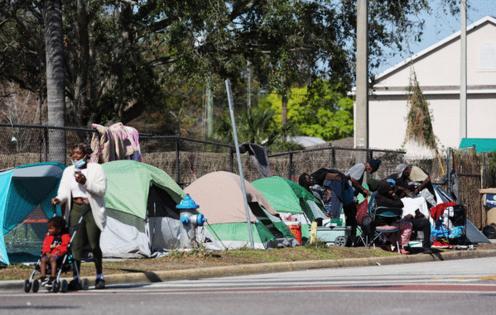How a Texas-based think tank upended Florida's homelessness strategy
Published in News & Features
The critical elements of Florida’s bold new statewide homelessness policy emerged from the written prescriptions of a Texas-based conservative think tank bent on thwarting the nation’s “homeless-industrial complex,” according to records obtained by the Orlando Sentinel.
Emails show the Cicero Institute offered Florida lawmakers a menu of reforms last summer, sending them to the staff of House Speaker Paul Renner in July. It then worked persistently to secure the passage of House Bill 1365, which banned public camping and sought to move unsheltered people from sidewalks to sanctioned, highly structured encampments.
So successful were the Institute’s efforts in the Sunshine State that when Gov. Ron DeSantis signed the bill in March, Cicero’s co-founder, billionaire tech investor and GOP mega-donor Joe Lonsdale cheered it as setting an example for the rest of the country to follow.
“When we started working on homelessness, many people considered these ideas fringe. Activists have vociferously opposed us at every turn. It takes guts to stand up to the homeless-industrial complex,” Lonsdale wrote in a blog post. “This is the strongest set of homelessness reforms in the nation, and we were proud to work with Florida leaders to see them adopted.”
And Cicero has many ideas about how Florida – and other states – can go further.
Also included in the policy memo, which the Sentinel obtained among other documentation of Cicero’s efforts in a public records request, are reform proposals making it easier to involuntarily commit somebody to psychiatric treatment, banning local care organizations from pursuing so-called “Housing First” initiatives to address homelessness, and funneling money toward mental health and substance abuse treatment instead.
Advocacy groups and organizations on the ground fear these policies – and Florida’s new law – will make their work to treat and combat homelessness even more challenging. Since the law’s requirements for sanctioned encampments make those facilities difficult to fund, locate and operate, and shelters are full most every night, it’s likely to force law enforcement to arrest people who have nowhere else to go but the streets, they say.
“What I anticipate, though, is this becomes a checklist,” said Martha Are, the CEO of the Homeless Services Network of Central Florida, assessing the influence of Cicero’s policy menu.
Cicero’s approach is not unique. Across the country, interest groups are pushing state legislatures to write their ideas into law, and some of the most successful have been conservative organizations working with GOP-led legislatures like Florida’s. The Florida-based Foundation for Government Accountability, for example, has pushed labor law changes that critics say weaken protections for child workers, scoring a signal success last year in Arkansas.
Cicero has interests in other issues as well, but its main focus has been homelessness, a vexing issue that has increasingly preoccupied state and local governments in Florida and elsewhere.
...continued
©2024 Orlando Sentinel. Visit orlandosentinel.com. Distributed by Tribune Content Agency, LLC.







Comments